- Home
- Vicki Delany
More Than Sorrow Page 3
More Than Sorrow Read online
Page 3
It would be nice, I thought, to set out a cushion, relax, catch some sun. But the sun was my enemy, and so I went back inside.
I found a magazine and settled down in the living room. I’ve always been a voracious reader, inordinately fond of classic Victorian novels, but since my injury I can scarcely concentrate on more than a sentence or two. Sometimes the words don’t make sense, even in books I’ve read and loved many times before. It’s incredibly frustrating, and can bring me to a rage of hurling the book across the room. The brain works in mysterious ways, they always tell me. I can read handwriting as well as I ever did. Just not print. Give it time, my doctor says, as he says about everything. However, there’s nothing else I can do, and not a heck of a lot of books are written in script, so these days I pretty much just flip through magazines, looking at the pictures. I tried audio books and sometimes listened to a book in bed, when I had trouble sleeping, but found my mind wandering so much I missed a good deal of what was happening.
I felt mildly guilty at not helping out around the house or farm, but the one time I’d tried operating the rototiller my head hurt so badly, I’d collapsed. Jake carried me into the house and I spent the rest of the day in bed. Now, my duties were limited to feeding chickens, collecting eggs, and tidying up the kitchen.
I woke with a start when the front door slammed shut. “Mom!” Lily yelled. “He’s here again.”
She came into the living room and saw me, blinking away sleep in the tattered wingback chair that was such a comfortable place to relax and look at magazine pictures or listen to books. “Sorry.” Her voice dropped to a whisper. “Were you asleep, Aunt Hannah?”
“No,” I said, “Just resting my eyes.”
“Where’s Mom?”
“I don’t know. I haven’t been outside for a while. Why are you home so early?”
“It’s not early. The bus dropped us off. Regular time.”
I’d slept all day. No doubt while the busy household crept around me trying not to make any noise. These old houses did have thick walls. I ran a quick check on my head. No sign of Omar. I struggled to get out of the depths of the chair, and Lily ran over to give me a hand.
“Who’s here?” I asked.
“Huh?”
“You said someone’s here?”
“That dog from next door. His name’s Buddy and he’s really old and he wanders down the road sometimes. Mom thinks he can’t remember how to get back home. It must be awful to get that old, don’t you think?”
I thought of my grandmother, ninety-one last birthday, with her lawn bowling and championship bridge and Caribbean cruises. I could only hope I’d inherited her genes. These days she was more active than I.
“He’s sitting on the front step,” Lily said. “I’ll take him home. It’s not far. Tell Mom where I’ve gone, will you.”
“Why don’t I come along? I could use the exercise.”
She gave me a dubious look. My doctors had told me I needed to walk regularly, keep myself mobile. It seemed like too much trouble. “I’ll be fine. And if I’m not, you have your cell phone, don’t you? We can call for help if we need it.”
“It doesn’t always get a signal further up the road.”
“Leave your mom a note on the kitchen table. In case she comes looking for me…I mean for you.”
“I guess that’s okay,” Lily said. “I’m getting an apple and some cheese. Want anything?”
“No, thanks. Do we need a leash or anything for this dog?”
“He’ll follow me.”
I went to the enclosed back porch that had been stuck onto the east side of the house off the office and searched for my hiking shoes in the mad jumble of a farming family’s outdoor footwear. I was sitting on the bench tying the last of the laces when Lily joined me, munching on a wrinkled red apple, and slipped into her running shoes.
We walked around the house and there on the front step sat the saddest-looking dog I’d seen since I’d last been in the Middle East. It was a border collie, black and white, with wet and rheumy eyes, half of its right ear missing, and a muzzle completely gray.
He lifted his one and a half ears and struggled to his feet when he caught sight of Lily. The stubby tail wagged.
“There’s a good boy,” she said, giving him a scratch on the top of his head. Digging into her pocket she pulled out a hunk of yellow cheese, wrapped in a paper towel. Breaking off a piece she held it toward the dog. It instantly disappeared.
Not so senile after all, I thought.
“You shouldn’t feed him, Lily, if you don’t want him coming around.”
“I feel sorry for him,” she said. “Poor old thing. I hope when I’m old and decrepit someone will give me some cheese.”
“Did you leave that note for your mom?”
“Yes.”
“Let’s go then.”
Lily led the way, the dog following eagerly although slowly. Something was wrong with one of his hips, and he walked with a twisted gait. We turned right at the top of the driveway and headed west. We could hear waves lapping on the rocky shore of the lake and catch glimpses of sun-sparkled blue water through patches of old trees and thick undergrowth. The road was lined with stately oaks and maples, buds bulging with new leaves like a woman heavy with child. The high branches reached toward each other creating a tunnel through which we and the road meandered. Dappled green light fell at our feet. Through gaps in the trees I could see across the fields and recognized the shape of my sister behind the wheel of the tractor. Most of the ground was brown and empty, but in the distance Liz and Allison were moving through the soft pale green and dark red foliage of the lettuce beds.
Lily chatted about goings on at school and how she couldn’t wait for classes to be finished and all the horseback riding she and her friend Ashley were going to do over the summer. Oh, to be ten years old again with the endless summer vacation stretching out ahead. The dog trotted along behind us, encouraged by pieces of cheese. The occasional farm vehicle drove past, the driver lifting a finger in greeting, otherwise it was perfectly quiet. To the east, about two kilometers up, the road came to dead end and so we didn’t get a lot of traffic. A soft wind stirred the nascent leaves.
We walked for no more than five minutes before coming to a driveway. The dog ran ahead up the gravel track.
“Can he find his way home from here?” I asked.
“Better make sure. We’ll walk him up to the house.”
“Have you thought about getting a dog yourself?”
“Yes,” she said with a snap in her voice. “But stupid Charlie’s allergic to dogs, so we can’t have one.”
“There are non-allergenic dogs, I’ve heard. Bred specifically for families that can’t have a regular dog.” I snapped my mouth shut, realizing I’d probably said too much. If Joanne and Jake had said no dogs, they wouldn’t be happy at me making kindly suggestions.
“Dad says,” Lily huffed, “we have chickens and horses and barn cats and that’s enough animals for one family. The cats aren’t pets, and you can’t play ball with chickens, and the horses are great, but they can’t come into the house and sleep in my bed, now can they? I’d like a dog.”
Obviously this aging Border Collie was Lily’s puppy-substitute. I could only hope it didn’t get hit by a car one day trotting down the road in search of scratches and cheese.
The driveway was a long one, the house not visible from the road. We climbed a small rise and through the bare trees caught a glimpse of the sparkling blue waters of Lake Ontario stretching out toward the horizon. Eventually the house came in sight. It was much newer than Joanne and Jake’s farmhouse, built in the sixties or seventies, with brown vinyl siding and a double attached garage. The garage doors were closed and no cars were in the driveway. Neat flowerbeds, empty, lined the front walk. The wide expanse of lawn had rec
ently been cut. Iron urns overflowing with purple and yellow pansies stood on either side of the front door.
“Doesn’t look like anyone’s home.”
“Hila’s always here.”
Hila?
We didn’t need to knock. As we reached the door, it swung open on silent hinges. A face peered out and I sucked in a breath and Omar roared to life. I felt heat and fire. I heard men yelling and women screaming and children crying. I knew hatred, fear, and bloodlust.
I cried out. No one heard me. My legs wanted to move, to flee, to run for my life. But they did not respond.
“Hi, Hila,” I heard Lily say from far, far away. “Look who’s been out exploring.”
Lily’s young voice broke through the images in my head. I dug the fingernails of my right hand into the palm of my left. I took a deep breath and tried to remind myself where I was. I fixed my eyes on the pansies until all I could see was their cheerful color.
“Naughty dog,” the woman said. “Thank you, Lily, for bringing him home.” Her English was nearly perfect, the accent light, her voice soft and low. Her hand rested on the doorframe. Her skin was the color of milky coffee and she had wide dark eyes framed by thick lashes. She wore a black tunic over long black trousers. A black scarf, shot with blue thread as bright as lake water, was wrapped around her head, the ends tossed over her shoulders.
“This is my aunt Hannah,” Lily said, very politely. “She’s staying with us for a while.”
I was standing slightly to one side and I don’t think the woman had seen me. Her head moved in surprise. Swiftly, her lashes dropped across her eyes. She hunched her shoulders so the scarf fell over her face. She pulled her hand into her long sleeve.
I struggled to find my voice although my head was wrapped in a cloud of agony. Usually the pain took time to build, slowly and threateningly, like a thunderstorm gathering on the horizon, giving me time to run for cover—and the bottle of pills. This time it had come on me full bore, all at once. Omar reached his long fingers down the nerves and stroked pain back to life. My world began to narrow as the dark veil moved in from the edges of my vision.
“Salaam Assalam o alykum.” I struggled to say the greeting in Pashto.
A ghost of a smile touched the edges of the woman’s mouth although she still did not look at me. She dipped her head. Lily gave the dog a hearty pat on its rump and pushed it toward the house. It walked inside on arthritic hips without giving us another glance.
“Bye,” Lily said, as if from the bottom of a rain barrel.
The woman began to close the door.
I wanted to say something. To ask her where she was from, what her village or city was. Ask her what she was doing here, in the countryside of Prince Edward County, Ontario.
By the time I had recovered what little remained of my wits, the dog was inside, the door shut.
The left side of the woman’s face, below the expressive brown eyes and above the full red lips, had been a mass of pink scar tissue stretching into her hairline. Her left hand little more than a lump of flesh, twisted, ravaged, three of the fingers nothing but rounded stubs.
I sucked in a breath.
Lily took my hand. “I’ll call Mom to come and get us.”
“No, I’m fine. That is, I can walk home. Don’t disturb your mom.”
And so we made our way up the driveway to the road lined with maples and oaks and down the sun-dappled, dusty road back to the farm. I kept my eyes focused on the ground in front of my feet and leaned heavily on my niece, her hand firm on my arm, the sun warm on my back.
By the time we got home, the pain was almost gone. It had been brought on by shock. The suddenness of seeing an Afghan woman, her horrible face, her tortured hand, her downcast eyes.
I said nothing to Lily or Joanne about what I’d seen in my mind’s eye. I would not be telling the neurologist either.
My head trauma brought me pain and the occasional loss of balance and forgetfulness and confusion. I’d never thought it affected my mind. Never before had I had a vision.
It hadn’t been like a memory or flash of scenes from a movie seen and then forgotten. It was as if I had been there. At that moment.
An explosion. A car on fire. Guns going off. Men firing rifles and cheering the flames on. Women weeping in horror. Children screaming, calling for their mothers.
Chapter Four
Hila Popalzai stood behind the curtains and watched the woman and child walk away. They’d come down the driveway with firm steps, smiling in the sun, laughing at a joke, Buddy trailing behind the girl he adored.
They went back with hesitant steps, the girl with her hand on the woman’s arm, the woman stumbling as if she couldn’t see the ground beneath her feet.
She was in pain, that woman. Pain that never left her, although she might have a moment’s relief to laugh with a young girl at the antics of an old dog. She spoke at least two words of Pashto, so unusual in Canada. She must have been to Afghanistan at some time.
Pain. She would have earned her pain in Afghanistan. A country of pain.
Hila studied her own hand, where the thumb and first finger held back the edge of the curtains. The other fingers good for nothing at all.
When she looked up again, the woman and girl were disappearing around the bend in the driveway. The girl, Lily, came by several days a week, leading Buddy home. They’d never said much. Hila scarcely knew what to say to a young girl whose hair swung behind her and whose eyes looked straight into your face. In the winter, she’d worn a heavy jacket, long pants, high boots, gloves. Now that spring was here, she’d discarded all of that and dressed in shorts that showed her bare legs and shirts that revealed her arms and the bones at the top of her thin chest. She was all knees and elbows and collarbones, but she would fill out soon enough.
And even then she would continue to wear clothes in which she could run free.
Hila had seen pictures, of course, back in Afghanistan. Pictures of Western cities and Western people. She’d known how they dressed. But still it had been an enormous shock when the plane landed in Toronto, and she walked into the concourse to be met by Maude Harrison dressed in jeans and a snug sweater underneath her coat. Then the drive through the city! The things she saw.
The first time Mrs. Harrison had suggested Hila take Buddy for a walk, she’d been shocked.
Walk! Outside! Alone!
She’d taken him as far as the bend in the driveway before scurrying back to the house. The next day she’d gone a bit further, and then a bit further after that. She avoided the roads, preferring to walk through the woods that edged the back yard. When snow covered the ground, big loud machines called snowmobiles carved trails through the trees and across the farmers’ fields and she could walk for a long time without encountering anyone else.
There, in the snow-covered Canadian woods, she found peace.
She heard the car before she saw it. The Harrisons home from their grocery shopping trip to Picton. She let the curtain drop and forced her ravaged face into a welcoming smile.
Chapter Five
Joanne was in the kitchen when we got home, stirring onions and garlic in the heavy cast-iron frying pan on the front burner. The sound of the TV came from the family room; screeching voices and canned laughter as fake as the people laughing. Steam rose from a large pot of water on the back of the stove. “Spaghetti for dinner tonight,” my sister said to our footsteps. She looked up and read my face. “Oh, dear, Hannah, not again.”
“I’ll be okay. It’s passing. I had a shock.” Lily lowered me into a chair. “Why on earth didn’t you tell me there’s an Afghan woman living next door?”
“There is?” Joanne looked at her daughter. Lily was opening the fridge and getting out the pitcher of apple juice.
“I didn’t know she was from Afghanistan,” Lily said. “I figu
red somewhere in South Asia, like the people who own the dollar store in town.”
“I’d heard something about an exchange student being at the Harrisons. I didn’t give it any more thought. I’m sorry, Hannah.”
“Don’t apologize. It doesn’t matter.” But it did. Of course it did.
Lily poured herself a drink. “Her name’s Hila.”
“How long is she staying there?”
Lily shrugged. She lifted her school backpack off the table. “Don’t know. Mrs. Harrison invites me in sometimes for juice and cookies. To thank me for bringing Buddy home, she says. Hila doesn’t talk much, but I like her. She’s nice.” Lily shifted her pack and looked at the floor.
“What?” Joanne asked.
“Nothing.”
“Is there something else about this Hila? Something bothering you?”
“No, Mom. You said it was okay for me to go into their house when I took Buddy home.” She shifted her feet again, lifted her head, and stared into her mother’s face.
She was lying, but I didn’t think it mattered much. It wasn’t my place to interfere. I said nothing.
“How old is she?” Joanne asked.
“It’s…uh…kinda hard to tell,” Lily said.
“What do you mean by that?”
“Did she say?” I swallowed, “what happened to her face and hand?”
“No. I figured a car accident or something. I’m not going to come out and ask, am I?”
“I guess not.”
“What’s the matter with her face?” Joanne asked.
“She has a scar. Really bad. And she’s missing three fingers.” Lily hoisted her backpack with a heavy sigh. “Math test tomorrow.”
“Then you’d better head upstairs and study. I’ll call when dinner’s ready. Tell Charlie to turn off the TV.”

 Silent Night, Deadly Night
Silent Night, Deadly Night Coral Reef Views
Coral Reef Views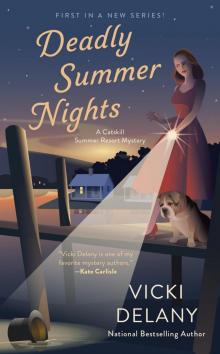 Deadly Summer Nights
Deadly Summer Nights Murder in a Teacup
Murder in a Teacup Whiteout
Whiteout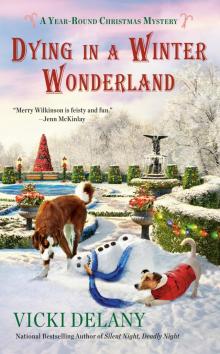 Dying in a Winter Wonderland
Dying in a Winter Wonderland Tea & Treachery
Tea & Treachery Rest Ye Murdered Gentlemen
Rest Ye Murdered Gentlemen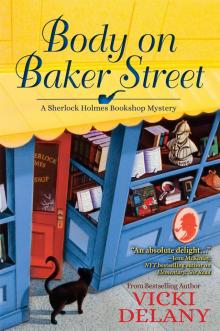 Body on Baker Street: A Sherlock Holmes Bookshop Mystery
Body on Baker Street: A Sherlock Holmes Bookshop Mystery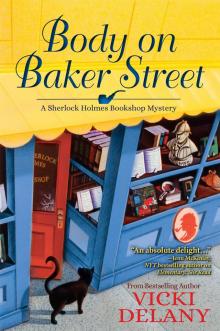 Body on Baker Street
Body on Baker Street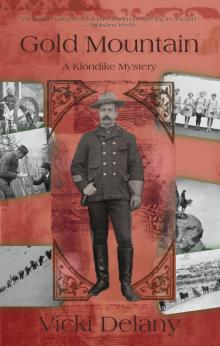 Gold Mountain
Gold Mountain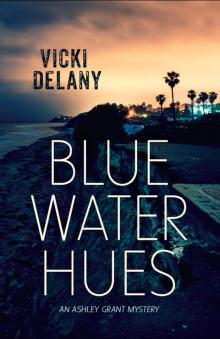 Blue Water Hues
Blue Water Hues Hark the Herald Angels Slay
Hark the Herald Angels Slay Murder at Lost Dog Lake
Murder at Lost Dog Lake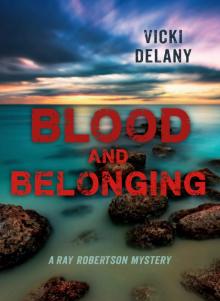 Blood and Belonging
Blood and Belonging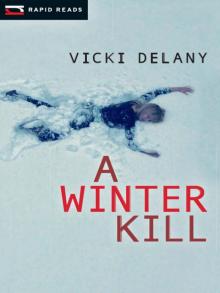 A Winter Kill
A Winter Kill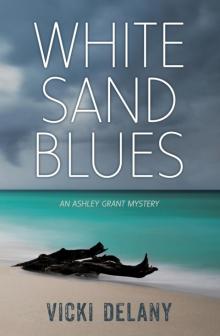 White Sand Blues
White Sand Blues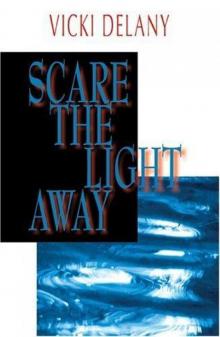 Scare the Light Away
Scare the Light Away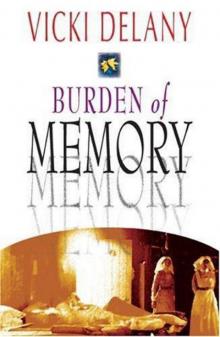 Burden of Memory
Burden of Memory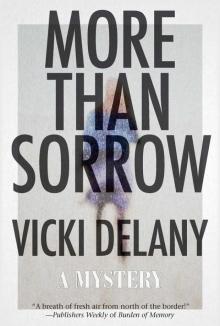 More Than Sorrow
More Than Sorrow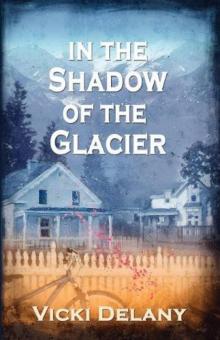 In the Shadow of the Glacier
In the Shadow of the Glacier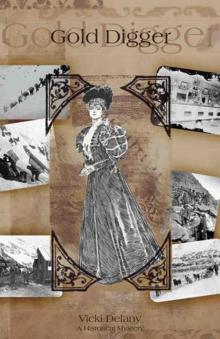 Gold Digger: A Klondike Mystery
Gold Digger: A Klondike Mystery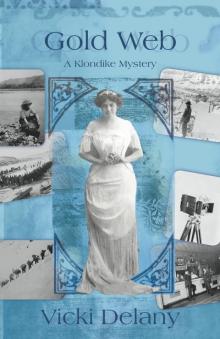 Gold Web
Gold Web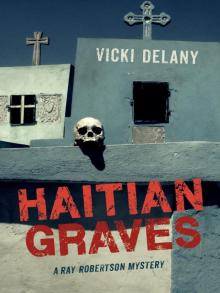 Haitian Graves
Haitian Graves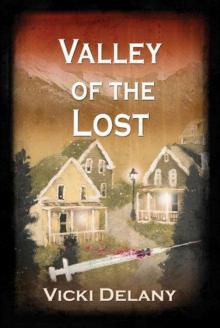 Valley of the Lost
Valley of the Lost We Wish You a Murderous Christmas
We Wish You a Murderous Christmas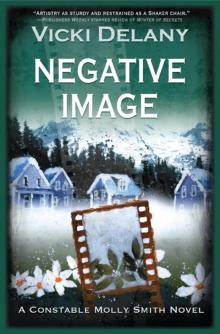 Negative Image
Negative Image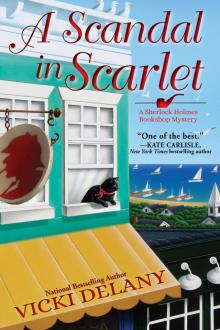 A Scandal in Scarlet
A Scandal in Scarlet Juba Good
Juba Good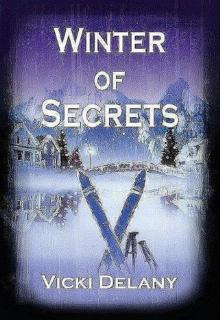 Winter of Secrets
Winter of Secrets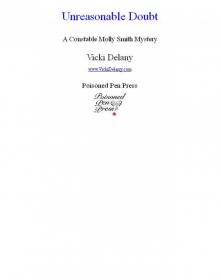 Unreasonable Doubt
Unreasonable Doubt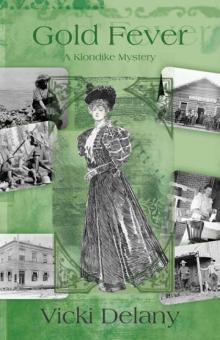 Gold Fever
Gold Fever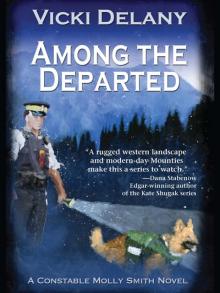 Among the Departed
Among the Departed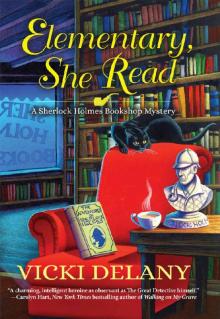 Elementary, She Read: A Sherlock Holmes Bookshop Mystery
Elementary, She Read: A Sherlock Holmes Bookshop Mystery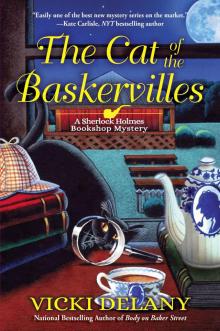 The Cat of the Baskervilles
The Cat of the Baskervilles